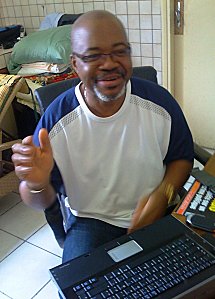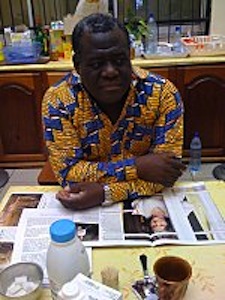This post is part of our special coverage on Gabon Unrest 2011
Following protests last week, tensions remain high in the West African nation of Gabon, as further demonstrations are now stifled by the authorities before they can take place.
The roots of the protests stem from a controversial presidential election in 2009 that saw the succession of Ali Bongo, son of former longstanding President Omar Bongo, in the midst of fraud allegations. The current wave of popular protests for free elections sweeping the African continent (Tunisia, Egypt and Côte d'Ivoire) has made the Gabonese government very wary of allowing protests to grow any larger.
Official vs ‘Unofficial’ Governments
In theory, there are currently two governments in Gabon: an official one headed by President Ali Bongo, son of former longstanding President Omar Bongo, and a second ‘unofficial’ government composed of two former Prime Ministers and former Interior Minister, André Mba Obame.
Obame has now been seeking asylum in the United Nations Development Programme (UNDP) building in Gabonese capital Libreville, along with other members of his ‘government’ for two weeks.

Self-proclaimed Gabon opposition 'President' Obame in the Libreville UNDP building, February 2011. Image from Le Gri-Gri International.

Opposition 'Prime Minister' Bandega-Lendoye in the Libreville UNDP building, February 2011. Image by Le Gri-Gri International.
Obame declared himself president following the broadcasting of the documentary ‘Francafrique’, directed by Patrick Benquet, on French public television channel France 2 in 2010. In the documentary Michel de Bonnecorse [fr], former chief of the African Division of the French Presidential Office, makes the following claim regarding the 2009 Gabon presidential election results:
“We have information that Obame got 42% and Ali Bongo 37%, and that the results were practically inverted.”
This declaration triggered internal political turmoil, which was heightened when President Bongo made amendments to the constitution in late 2010 that allowed him to extend term limits indefinitely in case of emergency.
A few weeks after the documentary was aired, whistleblower website WikiLeaks released a cable in which the American ambassador to Cameroon named senior Gabonese officials, including the late President and his son, as having benefitted from the embezzlement of around USD 36 million from the Bank of Central African States.
The money was claimed to have helped serve finance French political parties, including that of French President
Nicholas Sarkozy, on Omar Bongo's request.

Former Gabon President Omar Bongo with French President Nicholas Sarkozy. Still from the documentary 'Francafrique' (2010), directed by Patrick Benquet.
Vincent Bolloré, a French business man and personal friend of President Sarkozy, who heads the investment group Bolloré which deals in maritime freight and African trade, dismissed the crisis in an interview with InfosGabon, a pro-Ali Bongo news website:
L’agitation politique observée ces derniers jours au Gabon peut-elle, à un moment ou à un autre, entamer votre engagement pour le développement du Gabon ?
Systematic Impeachment of Protests in Gabon
Opposition politician Bruno Ben Moubamba announced via his Twitter account that peaceful demonstrations would be organised in Paris and in the Gabon capital Libreville on Saturday 5 February, 2011, to denounce the Bongo presidency:
Gabon – Grande Manifestation demain à Libreville / Gare Routière
The word was rapidly spread on the Internet via social networks and citizen media websites, and a march [fr] was held in Paris from Place de la Bastille to Place de la République:
But in Gabon, things have not been so easy. According to Moubamba, the planned 5 February demonstration was repressed by Ali Bongo's security forces:
Encore une fois les forces de sécurité à la solde du pvr gabonais ont choisi la répression / Manifestation de la Gare
On Tuesday 8 February, 2011, other demonstrations were dispersed in Gabon. According to online African paper Direct Scoop [fr], tear gas was used against protestors:
(…), les manifestants ont été dispersés par les gaz lacrymogène. ‘’Libreville est dans un état de siège qui ne dit son nom’’, souligne cette source
Tension at the UNDP Building in Libreville
Self proclaimed ‘President’ Obame has sought asylum in the United Nations Development Programme (UNDP) building in Libreville, along with other members of his ‘government’ for two weeks now.
National Union, Gabon's main opposition party, was dissolved on the order of Ali Bongo at the beginning of the political crisis.
After the news of the military attack [fr] surfaced, satirical online paper Le Gri-Gri International published a photo story [fr] showing opposition life in the UNDP office:
Ce n’est pas la vie de château, certes, mais les « exilés du PNUD » n’en perdent pas le moral pour autant. Confinés pour la bonne cause, et encerclés par les miliciens à la solde d’Ali Ben
Anti-USA and UN Rhetoric
There seems to be increasing pressure on the opposition from UN officials however, to vacate the UNDP premises. Jean-pierre Rougou, a source reputed to be close to the unofficial ‘government’, wrote on his social network Facebook profile:
La tension avec les responsables du système des nations unies est montée d'un cran aujourd'hui. le représentant algérien était extrêmement gêné de nous faire passer un message verbal de ses supérieurs à NY nous demandant si nous voulions quitter les lieux car ne pouvant nous forcer à le faire. Par ailleurs ils nous ont demandé de nous séparer de tous nos moyens de communication et de n'utiliser que le téléphone fixe du seul bureau auquel nous pouvons accéder.
In two press releases published on Tuesday 8 February, 2011, the unofficial opposition Gabonese government accused the United States’ ambassador in Gabon of keeping a guilty silence on violations by Ali Bongo and his regime against civil liberties.
Jean-pierre Rougou compared the response in a note posted on Facebook to that of the Swedish UN Secretary General Dag Hammarskjold; Hammarskjold's reaction to a Congolese political crisis in 1960 led to the assassination of the first legally elected Prime Minister of the Republic of the Congo, Patrice Lumumba.
En 1960, l’attitude du Secrétaire Général de l’ONU, le Suédois Dag Hammarskjöld, a conduit à l’assassinat de Patrice Lumumba.
En 1994, l’attitude des Nations-Unies au Rwanda a aboutit au résultat que l’on connait.
In 1994, the attitude of the United Nations towards Rwanda led to the result that we now know.
This post is part of our special coverage on Gabon Unrest 2011







13 comments